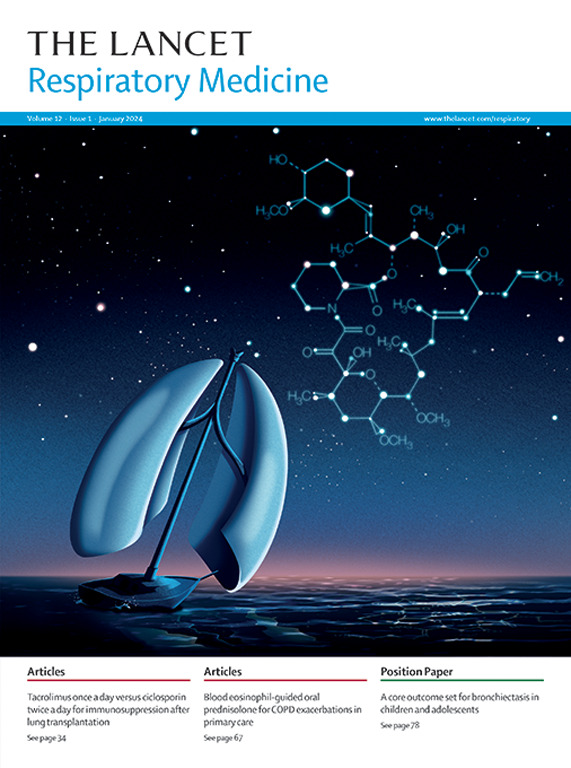Rare variants and survival of patients with idiopathic pulmonary fibrosis: analysis of a multicentre, observational cohort study with independent validation
IF 38.7
1区 医学
Q1 CRITICAL CARE MEDICINE
引用次数: 0
Abstract
Background
Rare pathogenic variants in telomere-related genes are associated with poorer clinical outcomes in idiopathic pulmonary fibrosis (IPF). We aimed to assess whether rare qualifying variants in monogenic adult-onset pulmonary fibrosis genes are associated with IPF survival. Using polygenic risk scores (PRS), we also evaluated the influence of common IPF risk variants in patients carrying the qualifying variants.Methods
We identified qualifying variants in telomere and non-telomere genes using whole-genome sequences from individuals clinically diagnosed with IPF and enrolled in the Pulmonary Fibrosis Foundation Patient Registry (PFFPR), a large multicentre, observational cohort study (March 29, 2016 to June 15, 2018, n=888). We also derived a PRS for IPF (PRS-IPF) from known common sentinel IPF variants. The primary outcome was the association between qualifying variants and survival. The secondary outcome was the association between qualifying variants and PRS-IPF. We used logistic regression models adjusted for sex, age at diagnosis, and principal components of genetic heterogeneity to examine the mutual relationship of qualifying variants and PRS-IPF. The association between qualifying variants and PRS-IPF with survival was tested using Cox proportional hazard models adjusted for baseline confounders. Validation of the results was sought in data from an independent multicentre, prospective, observational cohort study of IPF in the UK (PROFILE, May 17, 2010 to Sept 5, 2017, n=472), and results were meta-analysed under a fixed-effects model.Findings
We included 888 patients from PFFPR and 472 from PROFILE, totalling 1360 participants. In the PFFPR, carriers of qualifying variants in monogenic adult-onset pulmonary fibrosis genes were associated with lower PRS-IPF (odds ratio 1·79 [95% CI 1·15–2·81]; p=0·010) and shorter survival (hazard ratio 1·53 [1·12–2·10]; p=7·33 × 10–3). Individuals with the lowest PRS-IPF also had worse survival (1·61 [1·25–2·07]; p=1·87 × 10–4). These findings were validated in PROFILE and the meta-analysis of the results showed a consistent direction of effect across both cohorts.Interpretation
We found non-additive effects between qualifying variants and common risk variants in IPF survival, suggesting distinct disease subtypes and raising the possibility of using PRS to guide sequencing prioritisation. Assessing the carrier status for qualifying variants and modelling PRS-IPF promises to further contribute to predicting disease progression among patients with IPF.Funding
Instituto de Salud Carlos III; Instituto Tecnológico y de Eenergías Renovables; Cabildo Insular de Tenerife; Fundación DISA; National Heart, Lung, and Blood Institute of the US National Institutes of Health; and UK Medical Research Council.罕见变异和特发性肺纤维化患者的生存:一项独立验证的多中心观察性队列研究分析
端粒相关基因的少量致病变异与特发性肺纤维化(IPF)较差的临床结果相关。我们的目的是评估单基因成人发病肺纤维化基因中罕见的合格变异是否与IPF存活相关。使用多基因风险评分(PRS),我们还评估了常见IPF风险变异对携带合格变异的患者的影响。研究人员利用临床诊断为IPF的患者的全基因组序列,鉴定了端粒和非端粒基因的合格变异,并纳入了肺纤维化基金会患者登记处(PFFPR),这是一项大型多中心观察性队列研究(2016年3月29日至2018年6月15日,n=888)。我们还从已知的常见前哨IPF变体中导出了IPF的PRS (PRS-IPF)。主要结果是合格变异与生存率之间的关系。次要结局是合格变异与PRS-IPF之间的关联。我们使用调整了性别、诊断年龄和遗传异质性主成分的逻辑回归模型来检验合格变异与PRS-IPF的相互关系。使用Cox比例风险模型对基线混杂因素进行校正,检验合格变异和PRS-IPF与生存率之间的关系。研究人员从英国一项独立的多中心、前瞻性、观察性IPF队列研究(PROFILE, 2010年5月17日至2017年9月5日,n=472)的数据中寻求结果的验证,并在固定效应模型下对结果进行meta分析。研究结果:我们纳入了来自PFFPR的888名患者和来自PROFILE的472名患者,共1360名参与者。在PFFPR中,单基因成人发病肺纤维化基因的合格变异携带者与较低的PRS-IPF相关(优势比1.79 [95% CI 1.15 - 2.81];P = 0.010),生存期较短(风险比1.53 [1.12 - 2.10];p=7·33 × 10-3)。PRS-IPF最低的个体生存率也较差(1.61[1.25 - 2·07];p=1·87 × 10-4)。这些发现在PROFILE中得到了验证,结果的荟萃分析显示两个队列的效果方向一致。研究人员发现,在IPF生存中,合格变异和常见风险变异之间存在非加性效应,这表明存在不同的疾病亚型,并提高了使用PRS指导测序优先排序的可能性。评估合格变异的携带者状态和建立PRS-IPF模型有望进一步有助于预测IPF患者的疾病进展。卡洛斯三世基金研究所;Tecnológico y de Eenergías Renovables研究所;特内里费岛;Fundacion DISA;美国国立卫生研究院国家心肺血液研究所;和英国医学研究委员会
本文章由计算机程序翻译,如有差异,请以英文原文为准。
求助全文
约1分钟内获得全文
求助全文
来源期刊

Lancet Respiratory Medicine
RESPIRATORY SYSTEM-RESPIRATORY SYSTEM
CiteScore
87.10
自引率
0.70%
发文量
572
期刊介绍:
The Lancet Respiratory Medicine is a renowned journal specializing in respiratory medicine and critical care. Our publication features original research that aims to advocate for change or shed light on clinical practices in the field. Additionally, we provide informative reviews on various topics related to respiratory medicine and critical care, ensuring a comprehensive coverage of the subject.
The journal covers a wide range of topics including but not limited to asthma, acute respiratory distress syndrome (ARDS), chronic obstructive pulmonary disease (COPD), tobacco control, intensive care medicine, lung cancer, cystic fibrosis, pneumonia, sarcoidosis, sepsis, mesothelioma, sleep medicine, thoracic and reconstructive surgery, tuberculosis, palliative medicine, influenza, pulmonary hypertension, pulmonary vascular disease, and respiratory infections. By encompassing such a broad spectrum of subjects, we strive to address the diverse needs and interests of our readership.
 求助内容:
求助内容: 应助结果提醒方式:
应助结果提醒方式:


